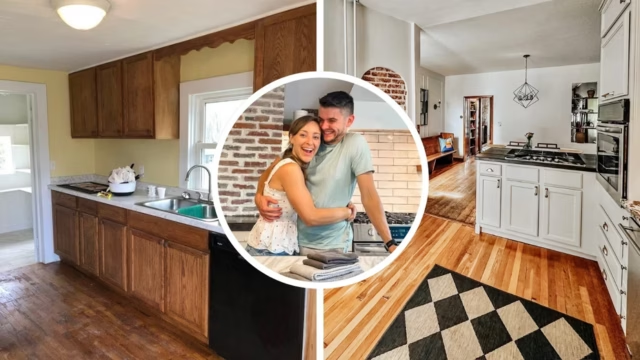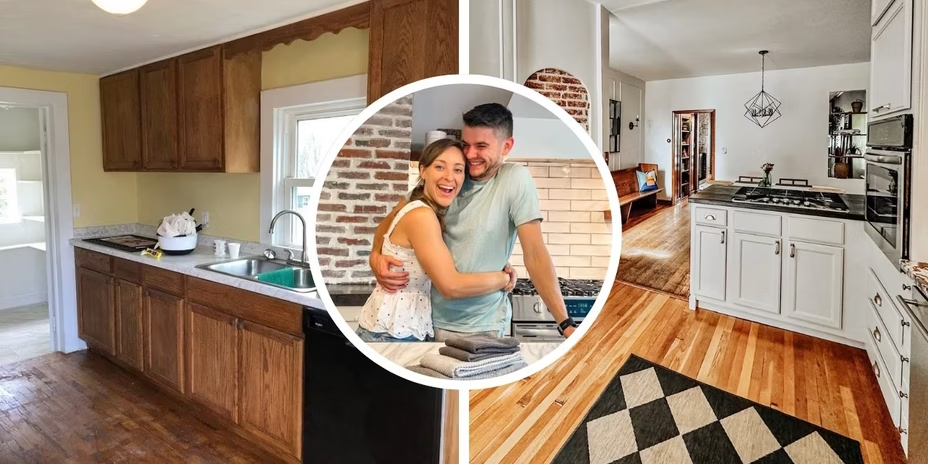
When Anna Julian happened upon a neglected row home in Baltimore seven years ago, she had no formal construction training—just determination, a willingness to make mistakes, and a keen knack for Googling DIY tips.
Today, that same determination remains, but what began as a simple renovation project has now become a lucrative revenue stream for Anna and her husband, Josiah Julian, who have built a thriving rental businessout of Baltimore’s crumbling historical housing stock, while also earning unlikely fame on social media, where they showcase their many home overhauls.
“I bought my first row home in Baltimore, and it was a bit of a fixer-upper, so I just decided to take it on and start learning from Google and YouTube,” Anna, who runs Renorowhome with her partner, tells Realtor.com®. “I started with the bathroom and learned how to do everything in that bathroom.”
While some might have thrown in the towel—or the sledgehammer, as it were—out of frustration during such a complex project, Anna found herself bitten by the renovation bug, which proved so infectious that it even drew her husband into her new hobby.
What began as a passion project has since developed into a full-blown side hustle for the couple, despite their lack of formal construction backgrounds.




Today, Anna, who works in marketing, and Josiah, a phys ed teacher, dedicate most of their spare time to reviving homes, with the hopes of eventually making real estate their full-time work.
“It’s so rewarding to see the before and after,” Anna explains. “Most of our houses were dirty and broken, but we could see the potential.”
“I feel a lot of pride when tenants love the space and can create memories there,” adds Josiah. “That’s a special thing we can do.”
Their first renovation was a two-bedroom row home in 2018. While maintaining the character of the 100-year-old building, complete with exposed brick and hardwood floors, they invested $25,000 to modernize it into a stylish, functional home—doing most of the work themselves.
“After the first time, we looked at what the house was worth. … That’s when Josiah came more on board, and we realized how much value our sweat equity added,” Anna recalls.
They tested the rental waters by renting out just one bedroom. But once they discovered a strong market for upscale, mid- to long-term rentals, the couple committed to a repeat cycle: buy, Google, renovate, and rent out.
Their tenants have included traveling professionals, and they say they have found tremendous amounts of joy from giving new life to Baltimore’s row homes.




Since 2018, they’ve taken on two more of the historical urban homes, both built between 1900 and 1920—projects that have both challenged and sharpened their construction and design skills.
That’s part of the appeal, Anna says. “I love the old architecture, and I feel like older homes are well-built.
“It’s fun to peel back the layers of all the different owners that have put their marks on it and just kind of go back to the original.”
The couple have found that fully furnished rentals with the utilities included best serve their market.
“We’ve mostly rented [out] to traveling nurses at Johns Hopkins, or people who need a place while moving,” Josiah explains. “When we do our rentals, we include everything. The house is ready to go for them to be comfortable from Day 1.”
Growing their portfolio has also given them stability and flexibility.
“When we just had one, the timing might not have lined up very well,” Anna says. “Now if one property isn’t open, we can offer another.”
In 2022, they expanded beyond Baltimore, purchasing a four-bedroom farmhouse in Luray, VA, for $221,000. After putting $30,000 into renovations, including a hot tub, they transformed the 104-year-old property into a cozy farm stay, perfect for larger groups and families.
That home is now available on Airbnb, where it can be booked for a minimum two-night stay, with prices as low as $350 a night. That sum goes up to more than $500 a night during more popular times.




Meanwhile, their row homes are offered as both short- and long-term rentals, with prices ranging from $2,400 per month for a two-bedroom, three-bathroom apartment to $3,400 per month for a furnished house.
The Julians also have major success on social media, where they document every aspect of their renovation process, while sharing tips and tricks that they have learned online.
What began as a way to keep friends and family updated has evolved into a platform to build community and promote their business.
“At first, I just wanted to share with my family and get inspiration from other house accounts,” Anna says.
Their Instagram gained traction with their most recent project: a 1960s ranch-style home in Baltimore’s suburbs, celebrated for its retro details and vintage wallpaper.
“People were just really interested in this house,” Anna says. “It’s been fun to see it grow the way it has.”
Its unusual screened-in porch has especially captivated followers.
“It’s superlong and kind of skinny on the front of the house, and people have been really interested in following along with that project,” Anna explains.





The internet has been more than a place to share their passion; it’s also been their classroom.
“The biggest thing is you can now go into YouTube and probably find a video for anything you need to learn about,” Anna says.
That digital know-how has even come to the rescue in a pinch.
“We had a garbage disposal clog at one of the rentals, and I didn’t have the right tools,” Josiah recalls.
Anna quickly found a TikTok tip using a broom handle, she recalls: “I had spent 30 minutes trying to fix it. The broom thing worked. It was kind of incredible.”
Though the couple’s foray into real estate wasn’t planned, they say the work isn’t for everyone.
“You have to be willing to put in the time,” Anna says. “If you’re not passionate about it, don’t do it. It’s going to eat up all your free time.
“But for us, it’s been really exciting to grow a business together.”
BY TESSA PARKER
OCTOBER 4, 2025
Realtor.com





